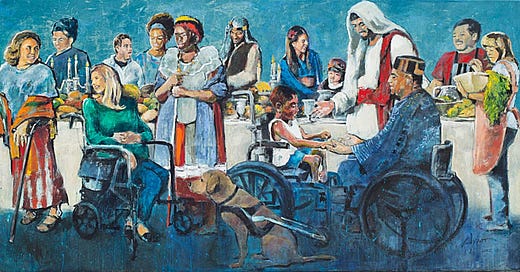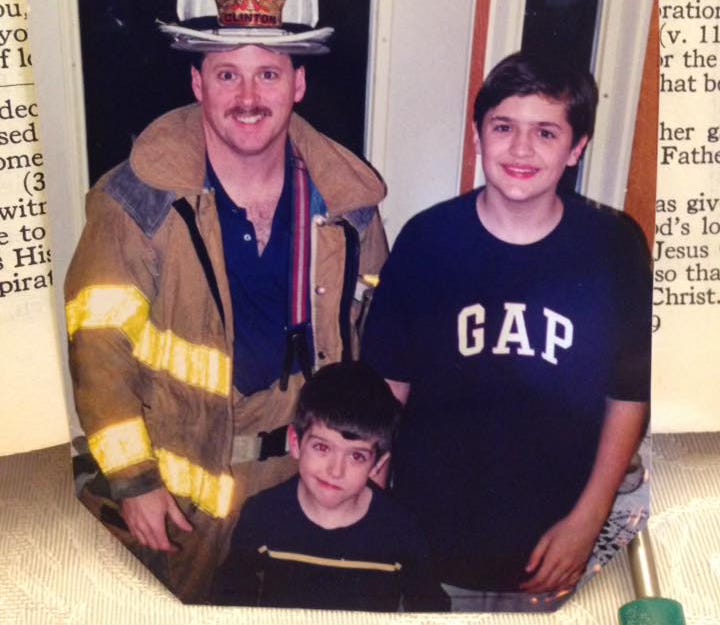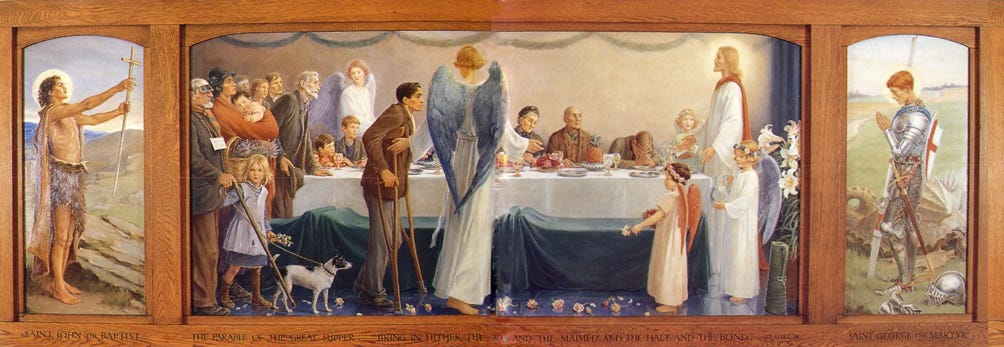Luke 14:12-14
Then Jesus said to his host, “When you give a luncheon or dinner, do not invite your friends, your brothers or sisters, your relatives, or your rich neighbors; if you do, they may invite you back and so you will be repaid. But when you give a banquet, invite the poor, the crippled, the lame, the blind, and you will be blessed.
The dinner table is where Jesus does some of his most insightful and scathing cultural critique; his meals were enacted sermons. But these meals were not just performative or metaphorical. The religious leaders called Jesus a glutton and a drunkard, because he legitimately enjoyed himself and the friends he gathered together. But Jesus’ joy and fellowship is also a rebuke to all our exclusionary tendencies. The table is where Jesus brings people together, but also where he highlights who we are leaving out.
Feeling left out is a universal experience. I was homeschooled almost every year growing up, but when I was 10, I spent one year in public school. That was the first time I was around people outside of my fundamentalist Christian bubble, and I was acutely aware of being a dorky little weirdo.
One spring day I noticed many of my classmates were emotional, so I asked a boy near me why so many kids were crying. He told me that Biggie died. In NYC in 1997, this was a very big deal, but my sheltered, homeschooled ass had no idea who Biggie Smalls was– I wasn’t allowed to listen to secular music. I nodded and pretended like I was also shaken by this deep loss, but the reality was that I felt like a total outsider. It would have meant everything to me if someone had said, “Brian, how are you adjusting? If you’re ever confused about anything, or feel left out, just let me know. I got you.”
We all long for belonging— for someone to bridge the gulf of our estrangement.
In spite of this universal longing for connection and belonging for ourselves, we seem to always be leaving other people out. The history of humanity is a history of categorizing people in order to establish who is on top and who is on the bottom; who deserves to be welcomed, and who gets left out. Even though I had many experiences of feeling excluded, I went on to be a leader within an evangelical system responsible for the exclusion of LGBT people. Although we are hyper-aware of the ways we are excluded, we are often blind to how we exclude others.
The racial apartheid of the state of Israel is a brutal and tragic example of the way this can happen. The holocaust was inarguably one of the most inhumane atrocities in human history. Jews were singled out, scapegoated, and murdered by the millions. In the wake of this tragedy, international sympathy paved the way for a Jewish state in Palestine, despite the fact that this act displaced over 700,000 indigenous Palestinians. Even though the Jewish people knew what it was to be treated differently simply because of their ethnic background, the state of Israel tragically has done exactly that to Palestinians. In Israel, ethnic Arabs have a lesser set of rights and privileges than Jewish citizens.
In his powerful book, “The Message,” Ta-Nehisi Coates describes his visit to Israel and Palestine. Describing a conversation with Israeli citizens, Coates says, “They were raised under the story that the Jewish people were the ultimate victims of history. But they had been confronted with an incredible truth—that there was no ultimate victim, that victims and victimizers were ever flowing.”
This is how victims become oppressors. This story is recapitulated in all of our lives. All of us have been left out. The response of our ego is often to scramble to the top, from where we can leave others out. Until we see that we are all the same, and that leaving out any of us only perpetuates the universal disease of alienation, this cycle of victimization will continue.
Jesus illuminates this dynamic at a dinner party, surrounded by wealthy, important guests. He tells them that to be truly blessed– in other words, to live a truly human life, the life we were made for, the life that leads to flourishing and connection– they should invite “the poor, the crippled, the lame, the blind,” rather than the rich and connected people we are often clamoring to associate with.
Jesus specifically mentions poverty and disability, because in those days, these were seen as a mark of divine disfavor. This stigma pushed them to the margins of society. The poor and disabled were shut out of religious and social life. Although we might not say it in the same way, our communities still exclude people because of poverty and disability. We may not believe that a disabled or poor person is being punished by God, but we do rehearse bootstrapping narratives that people get what they deserve.
In order to justify treating people differently, we dehumanize them. Coates describes how this happens in Israeli apartheid: “An inhumane system demands inhumans, and so it produces them in stories, editorials, newscasts, movies, and television.” Stories are told that help justify why it is necessary to treat those of Arabic descent differently. They say things like, “the cultural differences are too great.” Or, “they are too barbaric.” “They aren’t like us.” The stories we tell about each other can deepen our separation, or they can help us see the humanity in all; that we are all made of the same stuff.
Why is this so hard for us? Though we crave belonging, we often seek it by proving our superiority rather than through genuine connection. The great theologian Paul Tillich defined sin as alienation. Alienation from God, from our fellow creatures, and from ourselves. Sin is separation, and salvation is a reunion. The powers of darkness are always at work, whispering lies of superiority and supremacy in our ears, telling us that there are people out there who deserve to be treated differently, people who deserve to be left out.
Jesus told stories to re-humanize us, and help us imagine a world of belonging. After he rebukes his fellow guests, Jesus tells them all a parable of a great banquet (see Luke 14:15-24). In his story, the wealthy host initially invites the usual sort of wealthy and socially honorable guests, but surprisingly, they all turn down the invitation. They are preoccupied with economic concerns and the accumulation of property. As Jesus says, “it is hard for a rich man to enter the kingdom of heaven” (Matt 19:24).
After their refusal, the wealthy host expands his invitation: “Go out quickly into the streets and alleys of the town and bring in the poor, the crippled, the blind and the lame… Go out to the highways and hedges and compel people to come in, that my house may be filled” (Luke 14:21, 23).
This is a parable of the kingdom of God, which is often pictured as a banquet. The beloved community is a feast of love that radically reorders society and challenges all systems of oppression and exclusion. Frederick Douglass, the black abolitionist, saw that message clearly in this parable. Douglass knew that although white Christianity was often used by the powerful to maintain divisions and social hierarchies, the spirituality of Jesus was meant to do just the opposite:
“There is another religion. It is that which takes off fetters instead of binding them on— that which breaks every yoke that lifts up the bowed down... It spreads its table to the lame, the halt, and the blind... It passes, link by link till it finds the lowest link in humanity's chain– humanity's most degraded form, in the most abject position. It reaches down its arm and tells them to stand up. This is Anti-Slavery– this is Christianity.”
Jesus condemned our exclusionary practices and the way we privilege some groups over others, but the whole history of the church can look a bit like an exercise in ignoring him completely. We have divided men from women, gay from straight, white from black, rich from poor, and perhaps most centrally, Christians from non-Christians. Contrary to the gospel of Jesus in which we are all invited to one universal table, we have placed the vast majority of the human race in the category of “damned” simply because they believe differently than we do. This is not the way of Jesus, who set one table for all.
True spirituality– true Christianity– must always spread its table to those being left out. In our deeply separated society, we exclude the poor, the disabled, immigrants, sexual minorities, and racial minorities– but the way of Jesus is to “go out to the highways and hedges and compel people to come in.” In other words, to intentionally dismantle the barriers keeping people out. To bridge the gulf of estrangement. To tell stories of belonging. To put an end to dehumanization. The invitation must go out, until our love finds the “lowest link in humanity’s chain.”
For this breath prayer, consider today whether you are in need of hearing a word of welcome, or if you are the one being sent to offer the host’s invitation.
Inhale: You call us to a feast (4 seconds)
-HOLD- (4 seconds)
Exhale: You leave no one out. (4 seconds)
Inhale: You call us to a feast (4 seconds)
-HOLD- (4 seconds)
Exhale: You welcome the weak. (4 seconds)









This is the question we should always ask ourselves: when heaping praise, offering constructive criticism, celebrating, mourning, and serving others. 🙌🏼🙌🏼🙌🏼
How are you going being inclusive of traditional evangelical Christians? Invited any around for dinner and help share their stories and experiences? True genuine traditional Christians are becoming a minority. Only 20% believe the Bible is the word of God